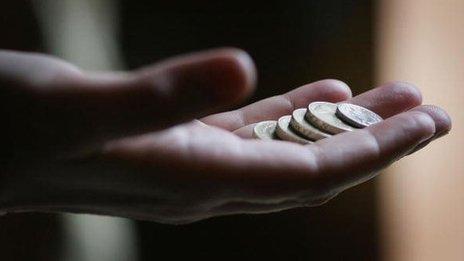NHS pay: A Catch-22 situation
- Published

It was the classic Catch-22.
Ministers felt on the one hand they couldn't afford to give staff a pay rise, while on the other realising they couldn't afford not to.
The result? A pay rise for some, and (arguably) none for others. But the risk is that this turns out to be a fudge that makes no-one happy.
Despite the special protection the NHS enjoys - it is getting a 0.1% increase in its budget each year this Parliament - it is still in the middle of its tightest ever settlement.
To help cope with rising demands, it has been asked to save the equivalent of 4% a year (£4bn to £5bn in cash terms).
The easiest way to achieve this is by freezing pay, which accounts for 40% of the overall budget.
And so this is what has been done - for the past three years.
NHS Employers had argued this should have continued into 2014-15, saying in its submission on pay that salaries in the health service remained "competitive".
It pointed out that average pay last year was just over £30,000 for nurses and around £36,000 for paramedics and £110,000 for consultants.
Impact on care
But the decision announced by the government on Thursday concedes a pay rise of sorts is needed.
All NHS staff will get at least a 1% pay rise. Just over half receive incremental pay rises each year - determined by their length of service and performance.
Those whose incremental increase is less will have their pay rise made up to 1%, but many will get more. Last year, the average incremental pay rise was 3.5%.

The same mechanism will be applied in 2015-16, when the minimum rise will also be 1%.
That will cost well over £1bn each year.
The bean counters in the health service will be warning this will be hard to afford
But equally it has left the unions disappointed.
Unison is pointing out that since 2010, pay has fallen by 10% once inflation is taken into account and that incremental pay is meant to reward the growing competence and skills that come with experience.
Hence Unison head of health Christina McAnea's accusation that the government is showing "complete contempt" for staff.
But, of course, what matters to patients is how this affects care.
Part of the Department of Health's justification for the move was that it needs to be able to afford the right number of staff to meet the requirements of the public inquiry into Stafford Hospital for more compassionate care.
However, if the pay award demoralises staff that ambition could be at risk.
A report published earlier this year by the Point of Care Foundation looked at the importance of having an engaged and happy workforce. One of the key conclusions was that this was essential to providing good quality care.